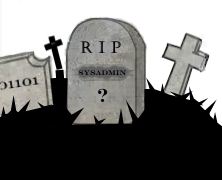One of the problems with being an accidental sysadmin – or really any kind of sysadmin – is that other people make inaccurate assumptions about what you can do and what you know. “You work for a computer company, don’t you? I can’t get to my files and there’s this popup asking me for something called BitCoin…. Can you just get rid of the popups for me?” (Sure. Along with your entire operating system, which I am going to have to delete and then reinstall. I hope you’re up to date on your backups. Please tell me you have backups. Oh, you thought I could just make the ransomware magically go away?*) Sometimes the weird demands come simply because the person doing the asking doesn’t know what is possible in the ever-changing world of IT. But sometimes the requested help is theoretically possible. Maybe. You think. It’s then a case of hitting the internet to see if a) other people have the problem b) it really is fixable and c) someone can explain how to fix it in enough detail that you aren’t mucking blindly about editing the Windows Registry, for example. (Don’t do that, at least not blindly.) You could just head straight to the search engine and give your Google-fu a workout. But this column is supposed to be about saving you time, so behold: sites where you can ask your troubleshooting question and have a decent chance of it being answered usefully. Stack Exchange “That’s the big one,” according to my highly unscientific survey of exactly one other sysadmin. But he does have decades of experience, and he has a good point. Stack Exchange is enormous. And more valuably, it is organized and focused. Stack Exchange is actually a collection of...
The Accidental Sysadmin
posted by Katherine Gorham
Welcome to first installment of The Accidental Sysadmin, a column for people on the front lines of IT who are still wondering how they got there. Because I share an office with this guy, I have been hearing a lot about the death of the sysadmin. This isn’t what it sounds like. It wasn’t Colonel Mustard in the server room with the cable crimper. There are no overworked nerds combusting from sheer stress. I’m talking about the demise of sysadmin as a job title. Actually, I’m quite sure that there are overworked nerds combusting from sheer stress, but that’s not what I’m on about here. Whether you call your sysadmin a computer systems administrator, the IT guy, some flavour of “engineer” or even an “architect”, the jobs are under threat. Technology is evolving, demands are changing, and this is changing the nature of systems administration. Corporate IT is getting easier to administer. No seriously, stop laughing for a minute. It is. IT administration is still frustrating and labor-intensive, but it is no longer the sort of job that only a highly-trained, expensively-accredited Mensa member with advanced skills in black magic can perform. Advances in hardware mean that businesses who formerly needed their own data center can make do with a half-rack of hyperconverged gear shoved in the corner of any room with decent air conditioning. Businesses who never needed a data center in the first place may have simply done away with most of their equipment and turned to various public cloud services for their compute, storage, applications, and analytics. As my office-mate wrote, “These tools make it easy for a handful of half-way competent generalists to accomplish what once required teams of specialists.” That’s me: the halfway competent generalist. Don’t you work at a computer...


